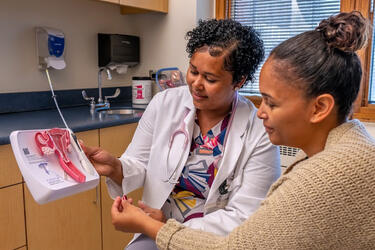
Appointments
Need a checkup? Not feeling well? Getting the care you need starts with scheduling the right type of appointment.
What happens during a gynecological appointment?
Visit our FAQ for information about what to expect from your first visit with a Women’s Health provider.
Ask Our Digital Navigator
Need to schedule an appointment? Have a question about our services? Our friendly Digital Navigator is here to help.
MIT Student Insurance Office
The MIT Student Insurance Office is here to provide the coverage you need to keep you healthy during your time at MIT.



